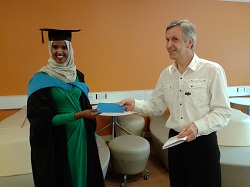Hibo Siyad wins the Bernie Asmore Prize for Student Achievement and Engagement
Date 16.11.2015

Congratulations to Hibo Siyad, who is the latest recipient of the Bernie Ashmore Prize for Student Achievement and Engagement in the field of Globalisation and Development.
Bernie Ashmore was a very dedicated educationalist and was committed to promoting development and encouraging young people to get involved in his work. He set up a schools link programme with schools in Ghana and when he died in 2009, his wife Helen set up a fund in his memory to recognise student achievement and to encourage work in the development field.
The prize of £500 is to help support the winner in carrying out research, further study or work in the field. It is awarded each year to a high achieving student in the field of international development who has also shown a high level of commitment to practical work and continuing engagement in the field, whether through research, volunteer activities, or moving on to start a career in development work.
Hibo Siyad is a final-year student in International Development who has produced some outstanding work in the course of her studies. She conducted some very interesting and original research for her final year dissertation project on skin bleaching and the preference for fair skin among ethnic women. Her research focused specifically on Somalian women, both in Somalia, her country of origin, and within the Somali diaspora in this country.
For her research she carried out a series of in-depth qualitative interviews with a number of Somali women to understand the reasons for skin bleaching and why it is so widespread in the community. She is very interested in carrying out further work in the development field and, like previous recipients of the prize, would therefore be able to put the award to very good use.
Nick Sage, Subject Areas Coordinator Sociology at the University of Northampton, commented: “Hibo produced an impressive piece of research for her final-year dissertation on a very interesting and under-researched topic in international development, skin bleaching among ethnic women. This was a topic which had interested her from an early age because of her own experience within the Somali community. In my view her research makes a genuinely original contribution to the existing literature, combining an in-depth qualitative study of the personal experiences of Somali women with a broader analysis of the wider significance of skin bleaching in historical and global contexts.”